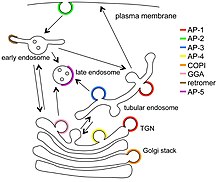

Vesicular transport adaptor proteins are proteins involved in forming complexes that function in the trafficking of molecules from one subcellular location to another.[2][3][4] These complexes concentrate the correct cargo molecules in vesicles that bud or extrude off of one organelle and travel to another location, where the cargo is delivered. While some of the details of how these adaptor proteins achieve their trafficking specificity has been worked out, there is still much to be learned.
There are several human disorders associated with defects in components of these complexes[5][6] including Alzheimer's and Parkinson's diseases.[7]
- ^ A different view of the 5 AP complexes can be seen here" Mattera R, Guardia CM, Sidhu SS, Bonifacino JS (2015). "Figure 1: Isolation of Tepsin as an AP-4 interactor". J Biol Chem. 290 (52): 30736–49. doi:10.1074/jbc.M115.683409. PMC 4692204. PMID 26542808.
- ^ Bonifacino JS (2014). "Adaptor proteins involved in polarized sorting". The Journal of Cell Biology. 204 (1): 7–17. doi:10.1083/jcb.201310021. PMC 3882786. PMID 24395635.
- ^ Paczkowski JE, Richardson BC, Fromme JC (2015). "Cargo adaptors: structures illuminate mechanisms regulating vesicle biogenesis". Trends in Cell Biology. 25 (7): 408–16. doi:10.1016/j.tcb.2015.02.005. PMC 4475447. PMID 25795254.
- ^ Robinson MS (2015). "Forty Years of Clathrin-coated Vesicles" (PDF). Traffic. 16 (12): 1210–38. doi:10.1111/tra.12335. PMID 26403691. S2CID 13761396.
- ^ De Matteis MA, Luini A (September 2011). "Mendelian disorders of membrane trafficking". The New England Journal of Medicine. 365 (10): 927–38. doi:10.1056/NEJMra0910494. PMID 21899453.
- ^ Bonifacino J (28 January 2014). "Adaptor diseases : bridging cell biology and medicine". videocast.nih.gov. National Institutes of Health. Retrieved 15 April 2017.
- ^ Small SA, Petsko GA (March 2015). "Retromer in Alzheimer disease, Parkinson disease and other neurological disorders". Nature Reviews. Neuroscience. 16 (3): 126–32. doi:10.1038/nrn3896. PMID 25669742. S2CID 5166260.